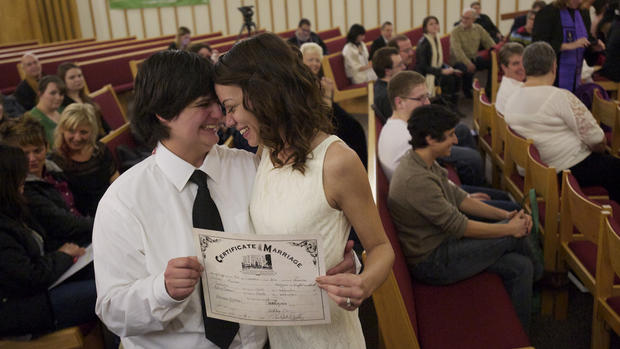Supreme Court to take up Prop. 8, DOMA
Updated 7:25 PM ET
The Supreme Court announced Friday that it will consider the constitutionality of the federal Defense of Marriage Act and California's ban on marriage, two cases that could have a significant impact on marriage laws across the country.
The Defense of Marriage Act (DOMA), passed by Congress and signed by President Clinton in 1996, prohibits federal recognition of same-sex marriages. Both the First and Second Circuit Court of appeals have struck down a provision of the law denying federal benefits, like Social Security benefits or the ability to file joint tax returns, to same-sex couples legally married. Because of these lower court rulings, DOMA has been declared unconstitutional in some regions of the country but not others -- an issue the Supreme Court now has a chance to rectify by reviewing the Second Circuit decision.
- Gay couples get marriage licenses in Washington state
- CBS News Poll: 51 percent support same-sex marriage
The court will also consider California's Proposition 8, the ballot initiative banning same-sex marriage that voters passed in 2008. Prop. 8 passed after the California Supreme Court granted same-sex couples the right to marry, putting California voters in the unique position of taking away rights granted by the court. After Prop. 8 passed, a federal court followed by the Ninth Circuit Court of Appeals said Prop. 8 was unconstitutional.
The high court is expected to hear arguments in both cases in March and issue rulings over the summer.
CBS News correspondent John Blackstone reported that many supporters of same-sex marriage were hoping the Supreme Court would not take this case. "It's bad news in the sense that if the court had denied review, we would have seen marriages very quickly within a few days again not only in San Francisco, but all over California," said Therese Stewart, San Francisco's deputy city attorney.
By taking up the Prop. 8 case, the court has given itself the opportunity to rule on the fundamental issue of whether same-sex couples have a right to get married -- that could extend marriage rights to same-sex couples nationwide. However, because of the unique circumstances of the case -- in which rights were taken away after they were granted by the state Supreme Court -- the court's ultimate ruling may only apply to California.
Alternatively, the court may not rule on the right to marry at all: The Supreme Court will also consider whether the proponents of Prop. 8 have any standing in court. If they don't, then the Supreme Court would send the case back to the lower courts to be properly defended. However, California's governor and attorney general -- the parties who would typically defend Prop. 8 -- are certain to refuse to defend the law, which would mean the current lower court rulings in favor of same-sex marriage would be left standing.
While this scenario wouldn't necessarily have a nationwide impact, it would still be a significant victory for gay rights activists. If the lower court rulings allowing same-sex marriage in California were allowed to stand, it would almost double the number of Americans living in a "marriage equality" state to 28 percent, the gay rights group the Human Rights Campaign told CBSNews.com
Public opinion seems to be shifting towards acceptance of same-sex marriage. In 2011, Gallup found for the first time that a majority of Americans supported it. And on Election Day this year, three states passed ballot initiatives allowing same-sex couples to marry -- making this year the first ever in which voters passed initiatives in favor, rather than against, same-sex marriage. The issue, however, is far from resolved. While nine states plus the District of Columbia allow same-sex marriage, many more -- 39 states -- prohibit it.
Tony Perkins, president of the conservative group the Family Research Council, said in a statement today that his organization is confident that DOMA is constitutional and hopeful the court will uphold Prop. 8. If it does not, Perkins said the issue of marriage could become even more divisive than the high court's Roe v. Wade decision.
"Marriage, unlike abortion laws in the 1970s, has been incorporated into the state constitutions of 30 states," he said. "Voters in these states will not accept an activist court redefining our most fundamental social institution."
The Human Rights Campaign, meanwhile, also said it is hopeful about the court cases. "As the Court has ruled 14 times in the past, marriage is a fundamental right and I believe they will side with liberty, freedom and equality, moving us toward a more perfect union as they have done in the past," Human Rights Campaign president Chad Griffin said in a statement.

